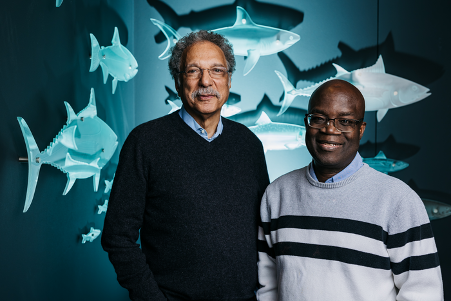A decade ago, T. J. Pitcher and W. W. L. Cheung highlighted the dichotomy in perceptions regarding the status of global fisheries, presenting a challenging outlook on the long-term sustainability of fisheries (Pitcher and Cheung, 2013). Their analysis underscored the pressures that marine ecosystems and fisheries are facing, arguing that without significant shifts toward ecosystem-based management, enforcement of regulations and more inclusive governance, the benefits of fisheries to society would be in jeopardy.
Now, Professor Cheung, alongside Tyler Award winning scientists Professors Daniel Pauly and Rashid Sumaila, provides an updated review of the status of global fisheries, reflecting on policy actions, key assessments and research findings over the past decade. The authors set out to determine if there is any hope or if there is just despair in global fisheries.
Photo: Daniel Pauly and Rashid Sumaila (l to r); Credit: Kim Bellavance
The authors say that while there is a growing recognition of the need for sustainable fisheries management and ocean protection, the overall status of fisheries has not improved. Despite progress in international and national policies addressing direct and indirect drivers such as climate change and harmful practices, these trends have not been reversed.
Many challenges identified by Pitcher and Cheung and others persist. Additionally, the academics identify new and emerging issues such as deep-sea mining, plastic pollution, unhealthy aquaculture development, increasing social inequity and the rapidly increasing push for the acceleration of the blue economy which are exacerbating the complexity of achieving fisheries and other ocean management goals.
Status of World Fisheries
The University of British Columbia scientists write that the overall global trends are moving in the wrong direction. Global fishing efforts continue to increase, while biodiversity loss is increasing. They go on to say that the impacts of climate change on fish and fisheries, which were previously recognised as a future threat, have now become a present and intensifying challenge.
Global catches from marine fisheries have stagnated since the 2010s after reaching a peak in the mid-1990s, although estimated fishing efforts continue to increase. The authors point to a recent global assessment of the status of fish stocks in the world which shows a continuously increasing trend in the number of overexploited stocks in the last few decades.
Hope or despair?
The authors point to advancements in monitoring technologies, such as satellite tracking of fishing vessels, as an area where new tools for improving transparency and accountability offer some hope. They also state that international push for protecting 30% of the world’s ocean by 2030, while still in need of more concrete enforcement measures, is a step in the right direction.
However, debating whether there is more hope or despair in global fisheries has become irrelevant, contend the authors, with their belief that pathways to ‘bend the curve’ for fisheries to be clear, and effective actions being urgently required to achieve desirable and sustainable fisheries.
Read the full paper online, ‘Hope or Despair Revisited: Assessing Progress and New Challenges in Global Fisheries’.
